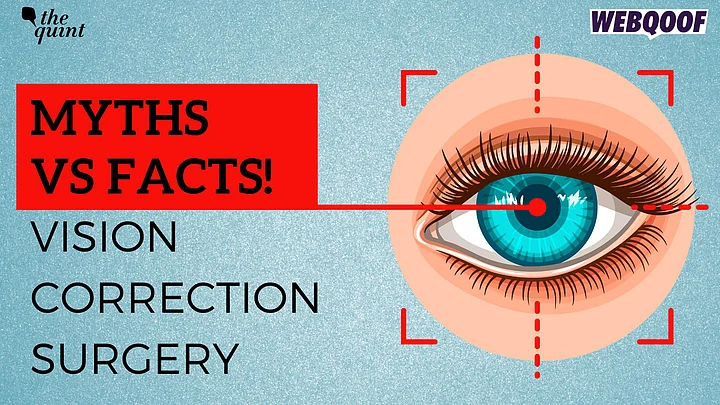Over 2.2 billion people worldwide suffer with vision impairments, according to the World Health Organisation (WHO). These include both distance impairment, also known as myopia and hypermetropia and near vision impairment, also known as presbyopia.
These issues can be solved with appropriate pair of spectacles, lenses or even corrective vision surgeries.
However, many of us are often worried about getting eye surgeries done due to the myths that hover over them.
FIT spoke to Dr Surpriya Samak Sriganesh, Ophthalmologist, Nethradhama Super Specialty Eye Hospital, Bangalore, Dr Aadithreya Varman, Director at Uma Eye Clinic and Dr P Suresh, HOD-Ophthalmology, Fortis Hospital, Mumbai, to break some myths related to vision correction surgeries.
MYTH 1: WEARING CONTACT LENSES OR SPECS IS BETTER THAN GETTING SURGERY
Wearing contact lenses or spectacles are not permanent solutions for vision-related issues leading to people's belief that they might cause less infections.
However, Dr. Aadithreya Varman clarifies that vision correction surgeries like SMILE (Small Incision Lenticule Extraction) are permanent solutions. These are also convenient to carry out day-to-day activities including active sports.
Dr P Suresh also states that over a period of time, contact lenses can cause dryness and have a potential risk of infections.
"It is not true that glasses or lenses are better than surgeries. The doctor can tell which is best for their patients," he adds.
MYTH 2: VISION CORRECTION SURGERY CAN INCREASE THE RISK OF EYE INFECTIONS
According to a study published in Indian Journal of Ophthalmology, infections after vision correction surgeries are not very high. It stated that incidence of post-Laser refractive surgery (LRS) infections is only between 0 percent and 1.5 percent.
Dr Surpriya Sriganesh told FIT that the likelihood of encountering an eye infection after undergoing vision correction surgery is indeed quite low.
"The prescribed regimen of post-operative eye drops, which are typically provided after the procedure, serves as a preventive measure against infections, contributing to a smoother recovery process and mitigating the associated risks," she added.
MYTH 3: VISION CORRECTION SURGERY IS NOT A PERMANENT SOLUTION
Laser eye surgeries involve reshaping the cornea to correct a refractive error, during which a laser is used to remove a pre-determined amount of tissue, explain doctors to FIT. This tissue does not grow back so the results obtained through surgeries are permanent.
Dr Suresh says, "In majority, vision correction surgeries are a permanent solution."
Dr Varman mentions that a large majority of people who have had laser eye surgery done do not need glasses afterwards.
She adds that in sporadic cases, visual aids such as glasses and contact lenses, can be used for small numbers that might occur again with age, this is also called presbyopia.
MYTH 4: VISION CORRECTION SURGERIES REQUIRE A VERY LONG TIME TO RECOVER
"This myth is not true. Most of vision correction surgeries, except for surface ablation, heal very fast. The period of healing is about a week," says Dr Suresh.
Dr Sriganesh states that the span of recovery can varies from person to person. Typically, within one or two days after the procedure, most patients experience excellent visual clarity which further stabilises in a week's time.
MYTH 5: ANY AGE GROUP CAN GET VISION CORRECTION SURGERY DONE
The WHO states that vision loss and issues can affect people of all ages; however, most people with vision impairment and blindness are over the age of 50 years.
According to Dr Sriganesh, age is one of the important factors in determining candidacy for such procedures because not all age groups are equally suitable candidates. She also states that operating fully matured and stabilised eyes is important, and this happens typically at the age of 18.
"PRESBYOND is a type of bladeless Lasik surgery which allows individuals beyond the age of 40 to be free of reading glasses," she adds.
"The ideal age group to undergo vision correction surgeries starts at 18. Most of the people prefer to do it in their 20s and 30s. So, there is no upper limit for age as long as suggested by the doctor," says Dr Suresh.
(At The Quint, we question everything. Play an active role in shaping our journalism by becoming a member today.)
